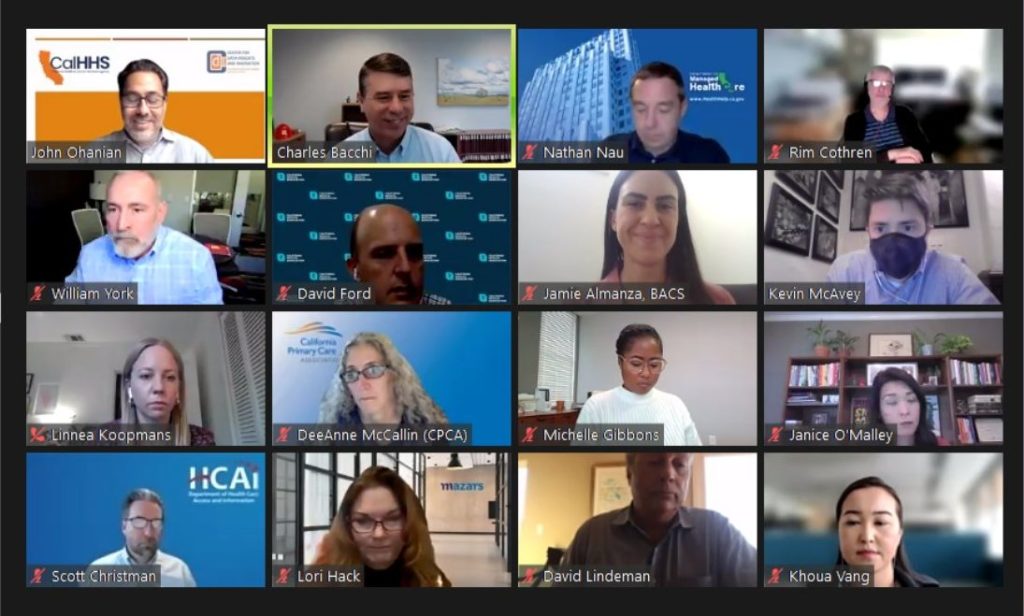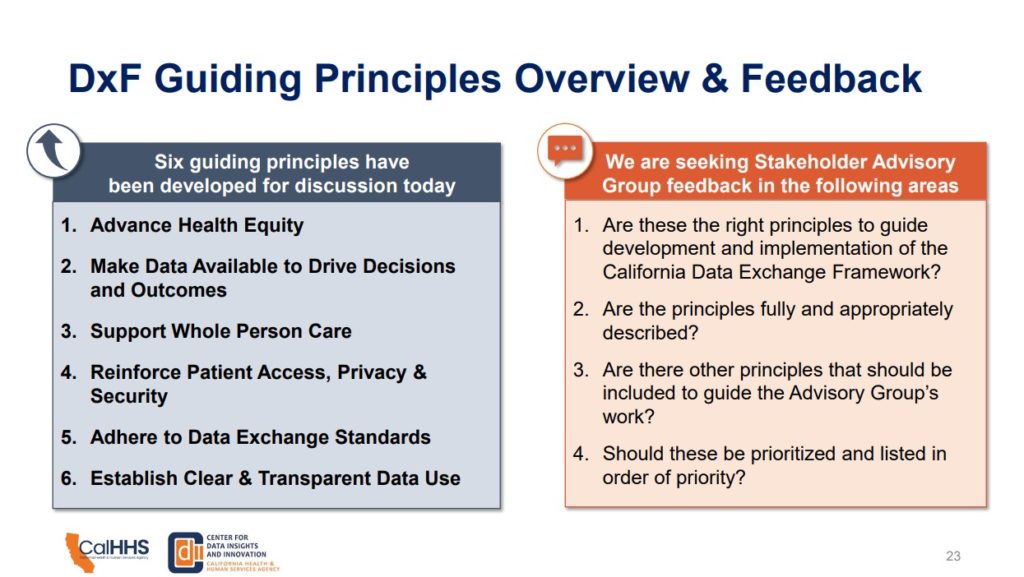
Data Exchange Framework Stakeholder Advisory Group Meeting #3
Urgency and ability to operationalize are two key areas of concern
“My worst fear is that we create a really nice report that doesn’t achieve exchange and doesn’t reach the goals we’ve indicated.”
– Claudia Williams, Chief Executive Officer, Manifest MedEx
As John Ohanian, Chief Data Officer, California Health and Human Services Agency (CalHHS) kicked off the third Stakeholder Advisory Group Meeting last week, he reminded the group that they were there to get consensus, “roll up our sleeves,” and “land the plane” – underscoring the need and urgency to quickly develop a Data Exchange Framework that would operationalize the data sharing requirements included in AB 133.
The Advisory Group launched into a robust discussion around the six guiding principles for Data Exchange Development proposed by CalHHS and quickly came to consensus on several areas:

- Get specific and “real.” The proposed DxF guiding principles need to be reframed with more direction and detail for implementation. Many voiced concern that while laudable and aspirational, the guiding principles were overly broad and lacked granularity and accountability.
“Many of these goals are not about how to actually operationalize this so I’m suggesting we add another set of principles that are operational principles. Here are the operational principles I recommend adding to ensure the framework actually WORKS and DELIVERS on our goals:
-
- Decrease burden, complexity, and cost of exchange
- Leverage the methods and networks that are already being used – don’t rip and replace; don’t duplicate
- Ensure every plan and provider can create longitudinal records needed for population health and whole person care
-
- Focus on the most important use cases first – don’t boil the ocean”
– Claudia Williams, Chief Executive Officer, Manifest MedEx
“Whether these are the right principles, I’d like to pursue Claudia’s suggestion that there are really two sets of principles – one about how data exchange can contribute to the system we want, and the others are much more specific to the actual exchange of data.”
– Carmela Coyle, President and Chief Executive Officer, California Hospital Association
“I want to second both what Claudia and Carmela said earlier about finding a way to tie these principles back to the job at hand, which is figuring out how to improve the exchange of health information data.”
– Charles Bacchi, President & Chief Executive Officer, California Association of Health Plans
- There is a need for urgency and to build on what exists, given the aggressive timeline requiring exchange among providers, hospitals, and health plans by 2024. California has been building health data exchange capability and capacity for decades and that infrastructure should be leveraged.
“We’re not trying to reinvent the wheel. We’re currently just taking those best practices and honing in on something that we think our group can really work on and accelerate our work.”
– John Ohanian, Chief Data Officer, CalHHS
“What we start with is not what we’re going to end with. This will be phased in and built over time…so let’s not wait until it’s absolutely perfected to actually start…We need to start somewhere.”
– Liz Gibboney, Chief Executive Officer, Partnership HealthPlan of California
“What I think we can incorporate into an urgency principle is to leverage what exists and to build upon what exists, in addition to moving forward as quickly as we can…because it’s so important for us to address things like disparities and inequities that exists today.”
– Jonah Frohlich, Managing Director, Manatt Health
- Advancing health equity remains a top priority. More specifically, members pointed to the need for equity in health information access for all providers and patients.
“It’ll be difficult to use health information exchange to advance health equity if we don’t put a big focus on connecting the providers who see the most diverse patient populations…this has to be a big part of our thinking.”
– David Ford, Vice President of Health Information Technology, California Medical Association
“When you think about the entire objective here about facilitating data exchange, we probably want to be mindful of equity in terms of portions of the social safety net.”
– Michelle Doty Cabrera, Executive Director, County Behavioral Health Directors Association
- Decreasing burden, complexity, and cost of exchange are critical. Related to the need for urgency and equity, Advisory Group members raised the need to make data exchange easy for providers and patients.
“It’s the principle at the ground level of not having providers have to put in the same data in 18 different systems, 18 different times…because it certainly is inefficient and leads to quality of care issues.”
– Jamie Almanza, Chief Executive Officer, Bay Area Community Services
“The cost of building an interface so that the data in a clinic can be shared needs to be addressed.”
– Lori Hack, Interim Chief Executive Officer, California Association of Health Information Exchanges (CAHIE)
“We have the pleasure of working with 1000+ healthcare organizations, plans, small practices, IPAs, hospitals, and with a very small number of exceptions, they can’t bring data from different sources, build interfaces, match and normalize the data. That expertise and capacity is also different from EHRs. They are not built to do that.”
– Claudia Williams, Chief Executive Officer, Manifest MedEx
The members also generally agreed that patient access, privacy, and security (Principle 4) should be split into two separate principles and that there needed to be more definition to data standards when thinking about the need to “adhere to data exchange standards” (Principle 5).
Manifest MedEx will continue to share updates from the front-line on this important initiative to transform care in our state. For a recap of past meetings, please check out News and Perspectives on our website.
We look forward to bringing the voice of our communities and participants to this ground-breaking work as it continues to develop.
The Advisory Group will meet next on December 14, 2021 from 10:00 AM to 12:30 PM. We invite you to follow @ManifestMedEx on Twitter for live tweets, share your thoughts with us at https://www.manifestmedex.org/contact/, and stay tuned for more updates!